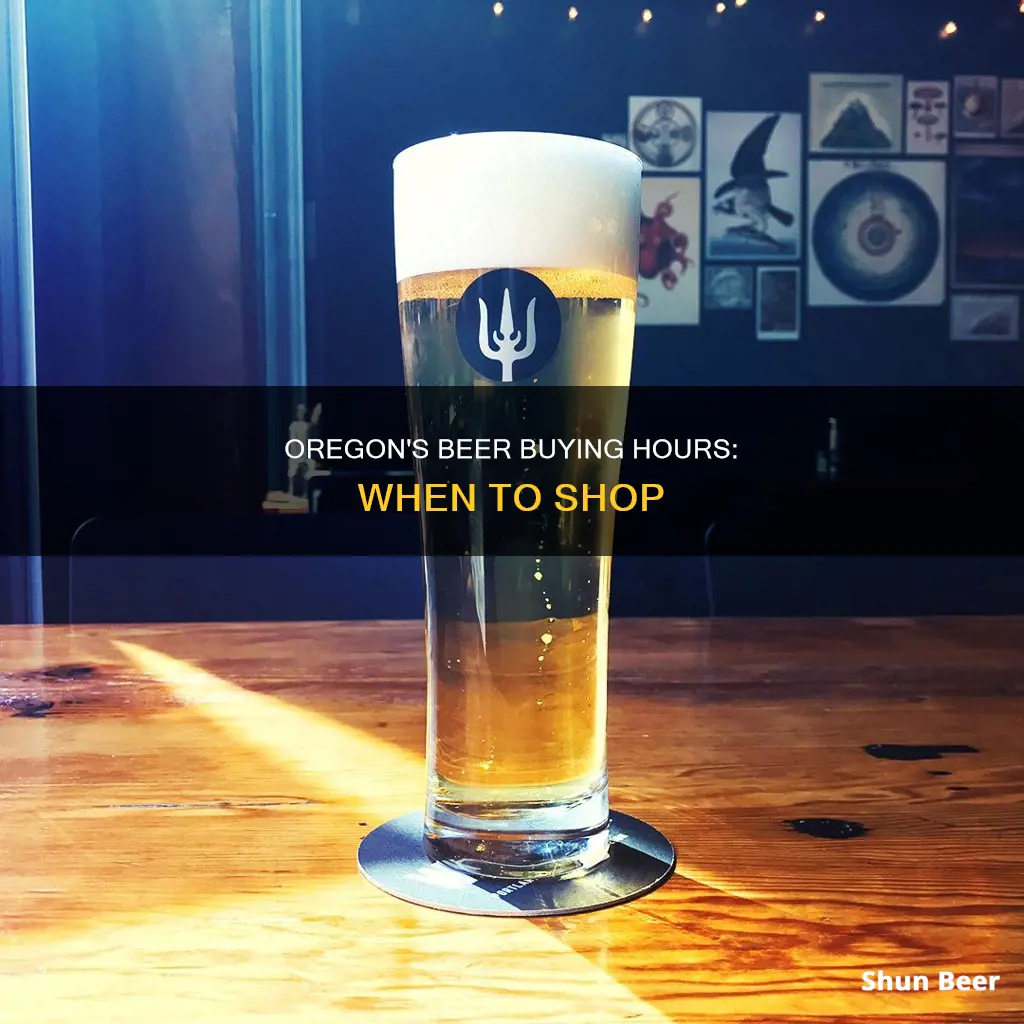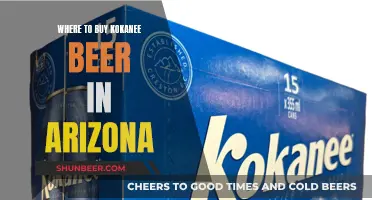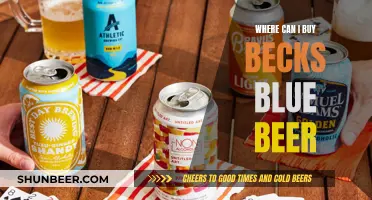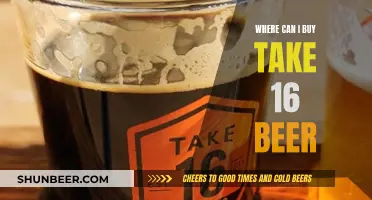
Oregon's laws on alcohol sales can be confusing, but the good news is that beer is widely available in the state. In fact, you can buy beer in Oregon any time between 6am or 7am and 2:30am, seven days a week. The Oregon Liquor and Cannabis Commission (OLCC) has strict guidelines on the sale of alcohol, and the state has a long history of regulating the sale and consumption of alcoholic beverages.
| Characteristics | Values |
|---|---|
| On-premise sale hours | 7:00 a.m. to 2:30 a.m. daily |
| Off-premise sale hours | 6:00 a.m. to 2:30 a.m. daily |
| State-run liquor store hours | 7:00 a.m. to 10:00 p.m. daily |
| Minimum age to buy alcohol | 21 |
| Minimum age to serve alcohol | 18 |
| Open container law | Prohibits open containers in vehicles |
| Drinking in public | Illegal |
What You'll Learn
- Beer, wine and liquor can be purchased between 7 a.m. and 2:30 a.m
- Alcohol can be bought from 6 a.m. if it's for off-premise consumption
- Oregon has strict laws prohibiting drinking in public
- Oregon has a government monopoly over the sale of spirits
- Oregon Liquor and Cannabis Commission (OLCC) has strict guidelines for licensed venues to sell alcohol responsibly

Beer, wine and liquor can be purchased between 7 a.m. and 2:30 a.m
Oregon has a long history of regulating the sale and consumption of alcoholic beverages, with the Oregon Liquor and Cannabis Commission (OLCC) holding a monopoly over the sale of all distilled beverages. Beer, wine, and liquor can be purchased for on- or off-premises consumption between 7 a.m. and 2:30 a.m. every day, including Sundays. This means that you can buy your alcoholic drinks as early as 7 a.m. and as late as 2:30 a.m. the next morning from retailers licensed by the OLCC.
The state has specific rules for different types of alcohol. Beer and wine can be found on supermarket shelves, in convenience stores, and even gas stations. On the other hand, distilled spirits or liquor are only sold in OLCC-run liquor stores and establishments with liquor licenses. The OLCC has strict guidelines and training to ensure that all licensed venues understand how to sell and serve alcoholic beverages safely.
During the COVID-19 pandemic, the OLCC approved a temporary rule allowing retailers to sell beer, wine, and cider starting at 6 a.m., an hour earlier than the usual 7 a.m. This was to accommodate high-risk and vulnerable shoppers who were shopping during the early hours of the day.
It's important to note that Oregon has strict laws regarding alcohol consumption. For example, it is illegal to drink alcohol in public, and there are open container laws that prohibit having an open container of alcohol in a vehicle. The legal drinking age in Oregon is 21, and it is illegal for those under 21 to purchase, attempt to purchase, or drive with any measurable amount of alcohol in their system.
Love's Points for Beer: Is It Possible?
You may want to see also

Alcohol can be bought from 6 a.m. if it's for off-premise consumption
In Oregon, the sale of alcohol is regulated by the Oregon Liquor and Cannabis Commission (OLCC), which holds a monopoly over the sale of all distilled beverages. The state has a long history of laws governing the sale and consumption of alcoholic beverages, dating back to 1844.
During the COVID-19 pandemic, the OLCC approved a temporary rule allowing OLCC-licensed retailers to sell beer, wine, and cider starting at 6 a.m., an hour earlier than the usual 7 a.m. This change was made to accommodate high-risk shoppers, such as the elderly and those with underlying medical conditions, who were shopping at grocery stores during early hours to avoid crowds.
While this temporary rule may no longer be in effect, it is important to note that alcohol laws in Oregon can be complex and may change over time. Generally, the sale of alcohol in Oregon is permitted from 7 a.m. to 2:30 a.m. every day, both for on-premise and off-premise consumption. This includes beer, wine, and spirits, which can be purchased at licensed retailers, grocery stores, and state-run liquor stores.
However, it is always a good idea to check the most up-to-date information regarding alcohol regulations in Oregon, as there may be specific rules and restrictions that apply in certain areas or under certain circumstances.
Alcohol-Free Beer in Turkey: What's the Deal?
You may want to see also

Oregon has strict laws prohibiting drinking in public
The Oregon Liquor Control Commission (OLCC) regulates the sale and service of alcohol in the state, and has strict guidelines and training in place to ensure that licensed venues understand how to sell and serve alcoholic drinks safely and responsibly. The OLCC has also approved temporary rules during the COVID-19 pandemic to allow retailers to sell beer, wine, and cider starting at 6 a.m., an hour earlier than the usual 7 a.m. start time. This change was made to accommodate vulnerable shoppers who were visiting stores early in the morning to avoid crowds and reduce their risk of contracting the virus.
Oregon also has strict laws regarding the sale of alcohol to minors. It is illegal to sell or serve alcohol to anyone under the age of 21, and those under 21 are prohibited from attempting to purchase alcohol, except in certain circumstances where they are helping the police. The state also has laws prohibiting drinking and driving, with a blood alcohol concentration (BAC) limit of 0.08% for most drivers and 0.04% for commercial drivers. For drivers under 21, any measurable amount of alcohol is considered driving under the influence.
While Oregon's alcohol laws can be complex and vary across the state, the prohibition on public drinking is clear. The state has strict laws in place to regulate the sale, service, and consumption of alcohol, with the aim of promoting safe and responsible drinking.
Buying Beer in Jacksboro, Texas: What You Need to Know
You may want to see also

Oregon has a government monopoly over the sale of spirits
Oregon has a long history of regulating the sale and consumption of alcoholic beverages, with the Oregon Liquor and Cannabis Commission (OLCC) holding a monopoly over the sale of spirits. The state has strict laws and guidelines regarding alcohol, with licensed retailers allowed to sell beer, wine, and cider from 6 a.m. to 2:30 a.m. for off-premise consumption and from 7 a.m. to 2:30 a.m. for on-premise consumption.
The OLCC was created in 1933, just days after the national repeal of Prohibition, to oversee the distribution, sales, and consumption of alcohol in Oregon. The commission has the authority to regulate and license alcohol manufacturers, sellers, and servers. It ensures that licensed venues understand how to sell and serve alcoholic beverages safely. Oregon is one of 17 alcoholic beverage control states in the U.S. that directly control alcohol sales.
The state has a unique system for selling spirits, with liquor stores operated and managed by state-appointed liquor agents who are independent contractors under the OLCC's supervision. Beer and wine can be sold in supermarkets and convenience stores, but spirits must be purchased from these state-run liquor stores or establishments with liquor licenses. This system is different from other states, where liquor sales are often allowed in grocery stores.
The OLCC has faced criticism for its organizational culture, with reports of rare liquor being set aside for higher managers and legislators. Despite this, the commission plays a crucial role in Oregon's alcohol industry, contributing significantly to the state's revenue. The state is also known for its thriving beer, wine, and liquor industries, with Portland being considered the nation's microbrew capital.
In summary, Oregon has a government monopoly over the sale of spirits through the OLCC, which regulates alcohol sales and distribution in the state. The state has strict laws and guidelines for alcohol sales, contributing to its extensive history of regulating the industry.
Buying Beer: Hannaford's Alcohol Policy Explained
You may want to see also

Oregon Liquor and Cannabis Commission (OLCC) has strict guidelines for licensed venues to sell alcohol responsibly
In Oregon, the sale of alcohol is strictly regulated by the Oregon Liquor and Cannabis Commission (OLCC). The OLCC has implemented specific guidelines to ensure that licensed venues sell alcohol responsibly and safely. These regulations are in place to protect public health and safety, particularly during the COVID-19 pandemic.
One key measure is the approved temporary rule that allows OLCC-licensed retailers to sell beer, wine, and cider starting at 6 a.m., an hour earlier than the usual 7 a.m. This decision was made to align with the opening hours of grocery stores that opened their doors early to accommodate high-risk shoppers, including the elderly and those with underlying medical conditions. The change in timing aimed to reduce the risk of exposure to vulnerable populations by eliminating the need for multiple trips to the store or shopping during busier hours.
The OLCC also has strict guidelines and training programs in place to ensure that all licensed venues understand how to sell and serve alcoholic beverages safely. These guidelines are designed to promote responsible alcohol service and reduce the potential harm associated with alcohol consumption. Licensed venues are educated on important topics such as identifying fake IDs, refusing service to intoxicated individuals, and ensuring compliance with open container laws.
In addition to the sale of alcoholic beverages, the OLCC also regulates the sale of distilled liquor. Unlike beer and wine, which can be purchased at supermarkets, convenience stores, and gas stations, distilled liquor is only sold in a limited number of state-sanctioned locations, including OLCC-run liquor stores and establishments with specific liquor licenses. These regulations are in place to maintain control over the distribution and sale of more potent forms of alcohol.
The OLCC takes its role in overseeing the alcohol industry seriously and continually evaluates and adapts its policies to balance the needs of consumers, businesses, and public health. By enforcing strict guidelines for licensed venues, the OLCC aims to foster a culture of responsible alcohol service and consumption in Oregon.
Buying Beer on Sundays in Caruthersville, Missouri: What's Allowed?
You may want to see also
Frequently asked questions
Beer can be bought in Oregon from 6am or 7am until 2:30am.
Beer can be purchased from bars and restaurants, package and liquor stores, and breweries and taprooms.
Yes, beer can be bought on Sundays at the same hours as any other day.
Yes, gas stations can sell beer, wine and cider from 7am-2:30am.
Yes, grocery stores can sell beer, wine and cider from 7am-2:30am.







